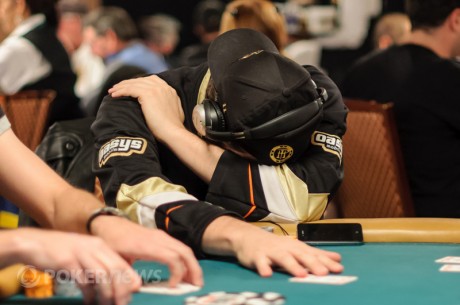The Poker Shrink, Vol. 52: The Butterfly Effect

Psychology is, at least in part, about teaching us how to effectively cope when life deals us setbacks. There are many ways to deal with life's little problems. One particularly effective way is perspective. Putting your problem in the proper place in your overall life. Here is one way to gain such perspective.
The butterfly effect serves as a metaphor for life in a chaotic, uncontrollable, unpredictable world. Specifically, it suggests that small events can have very large effects. The commonly used example is of a butterfly flapping its tiny wings over Japan and setting off a wind current that eventually causes a hurricane in America a week later.
The point?
Tiny changes in one place can have huge ramifications later on in another. Here is a concrete poker example. Its late in Day One of a major tournament, you are ready to come over the top of an opening bet with your J-J but the big stack steps in first and moves all in. You toss your jacks in the muck and curse your luck when the big stack shows 9-9 and takes out the other guy with A-K. That was your pot and then you hear that the big stack got that way earlier in the day when he was dealt pocket aces three times and ran down pocket queens or kings to build his stack. He is just lucky but now you have to deal with him sitting on your right reraising pot after pot in front of you.
Its not how he is playing that bugs you, it's the easy way he got his big stack with all those aces. The aces were the butterflies; the hurricane is now sitting at your table. Relax. You know all those short stacks you took out to get your chips? Well, they are the result of the same butterfly effect.
Here is my time-tested bad beat recovery tool, using the random, chaotic language of the butterfly effect. I call it the "688/687" truism. You have just won a 688-player poker tournament, you are getting your picture taken and your first-place prize counted out in Bellagio chips. No need for any psychological support here — congratulations. Now turn the wheel slightly, you are passing the final table and see them giving the prize money to another player, you busted out of that tournament ten hours ago. But you see that tournament only had 687 runners and just one less player meant the difference in winning or losing for every single one of the 687 or 688 players.
The final entrant in any tournament changes the entire event. Cards are dealt differently at his first table with an extra player. Tables breakdown just a bit faster with more players. Players are distributed to the empty seats around the room in a different order. That donkey doesn't give you his chips in the "687" tournament because he is seated at a different table. In the "688" event, you got those chips and they got you past that one bad beat and allowed you to play on and eventually win.
No, I am not saying that it's all random or that luck wins out over skill at the poker table. But I am definitely saying that there are hands being played at other tables that will eventually have a major effect on how you play your cards later in the tournament.
You know we always laugh at the absolute donkey who makes it to the final table as the chip leader, but we forget all the other really bad players who gave us their chips so that we could be at the final table to beat that donkey.
The point?
There are random events that happen away from your table that you cannot control. They actually have as much to do with who wins and who loses as your own play poker. So when you do get hit with the bad beat, the cold deck or the cooler, the best thing you can do for your sanity is to walk away from the table with two thoughts in your head:
First: "Seven-deuce off-suit beats pockets aces 12% of the time."
Second: "There are a lot of butterflies in Japan."
Check out the Poker Stars First Deposit Bonuses on PokerNews.com - Be sure to enter the bonus code only when making Your first deposit to Poker Stars








